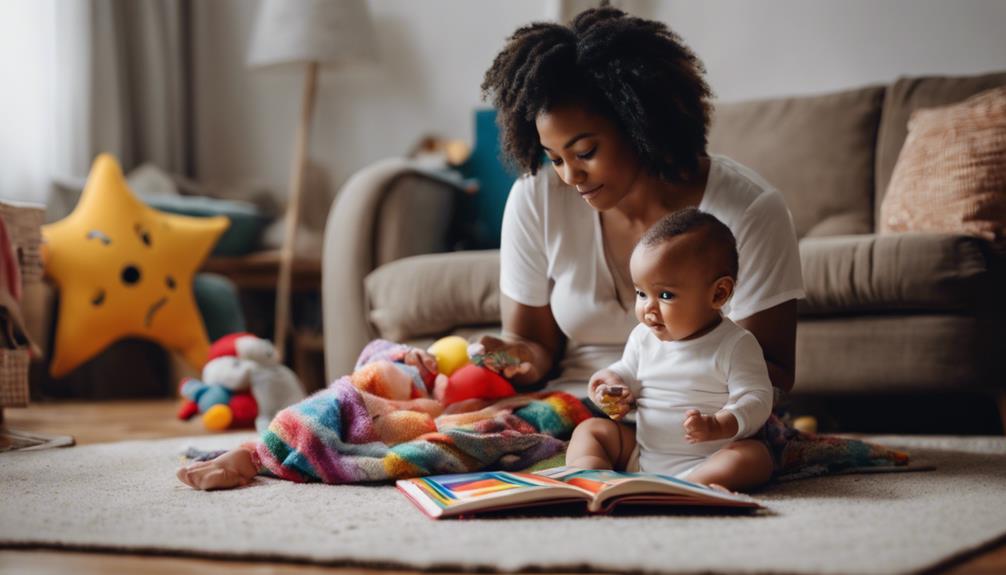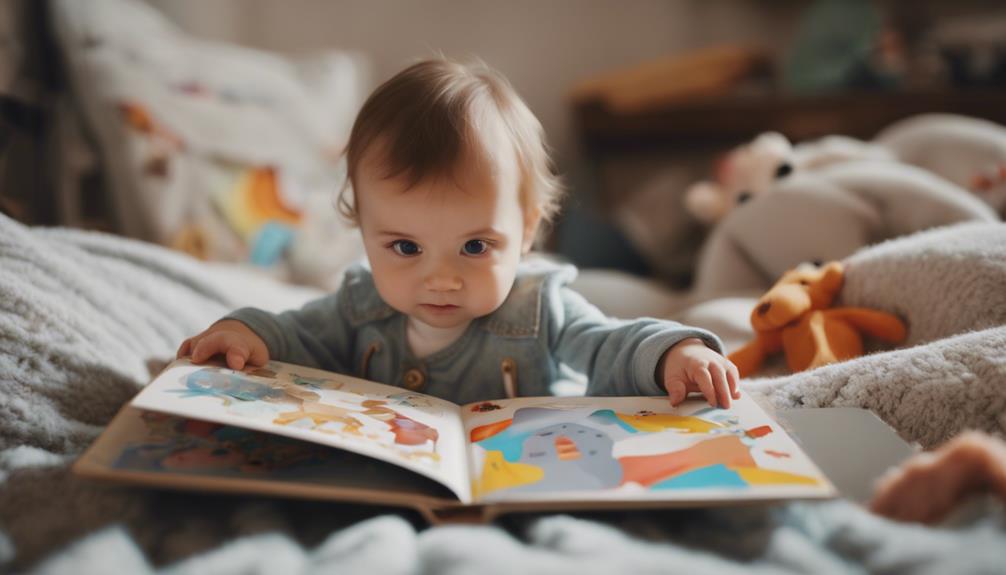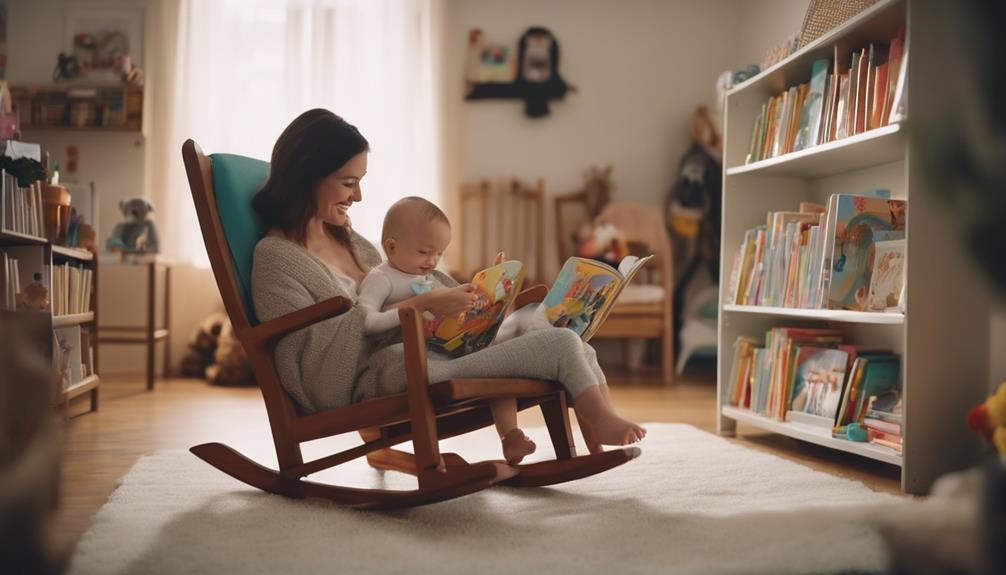You can begin reading to your infant from the very first days of their life. This initial exposure promotes brain development, enhances language skills, and strengthens your bond. As they mature, reading continues to aid cognitive growth and emotional well-being. For newborns, consider using high-contrast visuals and interactive board books. As your baby grows, introduce books with simple sentences and interactive features. Engaging with your young child through stories each day improves comprehension and sets the groundwork for literacy. It’s important to carefully select books with durable pages and colorful illustrations. By delving deeper into this subject, you will discover more reading strategies and book recommendations appropriate for your child’s age.
Key Takeaways
- Start reading to your baby from birth.
- Newborns benefit from the sensory stimulation of reading.
- Reading supports brain development and early literacy.
- Choose high-contrast, interactive books for engagement.
- Reading fosters bonding and language development.
Benefits of Reading to Babies
By reading to your baby, you're actively supporting their brain development and enhancing cognitive skills from birth. The benefits of reading to babies extend beyond simply sharing stories; it lays the groundwork for early literacy, language development, and building a strong bond with your little one. Research indicates that engaging in storytime with infants not only fosters a love for reading but also promotes cognitive growth. Through this shared activity, you aren't only aiding in their intellectual advancement but also creating a nurturing environment for emotional bonding.
Starting to read to your baby early on can have a profound impact on their overall development. As you read aloud, you're helping them relax, potentially aiding in better sleep patterns. This soothing activity isn't just about the words on the page; it's about the quality time spent together, laying the foundation for a lifelong love of learning and language.
Reading to Newborns

When it comes to reading to newborns, starting early is key for their development. Choosing appropriate books and incorporating reading into your daily routine can have lasting benefits on your baby's language skills.
Here are some reading tips for newborns that can help foster a love for books and support their cognitive growth.
Benefits of Early Reading
Early reading to newborns offers a multitude of benefits for their cognitive development and emotional well-being. It's important to read to your baby right from the start as it helps build their vocabulary, instills a love of reading, and enhances their pre-literacy skills. By exposing newborns to reading early on, you're providing them with a solid foundation for language and literacy development.
Reading aloud to your baby supports brain growth and the formation of neural connections essential for learning and cognition. Additionally, sharing storytime with your newborn strengthens the bond between you and your baby, fostering a secure attachment and promoting emotional well-being. Engaging in reading activities can also serve as a calming experience for newborns, aiding in relaxation and potentially contributing to better sleep patterns.
Initiating reading to your baby from birth maximizes the potential for optimal brain development, setting the stage for a lifelong journey of learning and growth.
Choosing Appropriate Books
To guarantee a positive reading experience for your newborn, selecting appropriate books that cater to their sensory development is essential. When choosing books for babies, opt for high-contrast pages to provide visual stimulation that captures their attention.
Interactive features such as textures and mirrors in board books can help engage newborns during reading sessions. These soft and durable board books are perfect for little hands to explore through touch, promoting sensory exploration and interaction.
Reading aloud to your newborn not only aids in bonding but also introduces them to the rhythm of language. Opt for books with simple patterns, faces, and colors to further captivate their interest.
Reading Tips for Newborns
Reading to your newborn is a wonderful way to nurture their development and bond with them from the very beginning. Start incorporating reading into your daily routine to introduce your baby to the joy of books early on.
Newborns benefit from high-contrast images, simple stories, and interactive books that engage their senses. Reading aloud to your baby not only enhances their language development but also boosts their cognitive skills. Experts recommend starting reading sessions with newborns to instill a love for books right from the start.
Consider using board books or cloth books that are safe for infants to explore. Make reading a calming and enjoyable experience for your baby by choosing a quiet and comfortable environment.
Even before birth, reading to your baby can support their brain development and create a special bond between you and your little one. Embrace the magic of storytelling with your newborn and watch as they begin to love the world of books.
Reading at 3-6 Months

At 3-6 months, babies derive significant benefits from exposure to board books featuring high-contrast images and simple stories. Reading to babies at this age aids in visual development, cognitive stimulation, language acquisition, and listening skills. To make the most of reading sessions with your little one, consider the following tips:
- Choose Board Books: Opt for sturdy board books that can withstand curious hands and mouths.
- Utilize Interactive Features: Look for books with textures, flaps, or sound buttons to engage your baby during reading time.
- Simplify Content: Introduce books with one clear object or person per page to help babies focus on the story.
- Read Aloud: Reading aloud to your baby not only exposes them to language but also helps strengthen their listening skills.
Reading at 6-12 Months

As your baby progresses from 3-6 months to 6-12 months, their engagement with board books can evolve to include interactive elements that foster exploration and language development.
Babies love interactive elements in books at this age. Opt for board books with one object or person per page to maintain their attention.
Introduce books with simple sentences or a brief narrative to expose them gradually to language and storytelling. Encourage participation by asking simple questions about the images or objects in the book during reading sessions.
Interactive books with surprises can engage babies, encouraging them to explore and interact with the story. Reading to babies aged 6-12 months helps them connect words with meanings, supporting their language development.
Reading to Toddlers

To engage toddlers effectively in reading sessions, encourage their love for books post their first birthday to foster pre-literacy skills and comprehension. Reading to children at this stage is essential for their development.
Here are some tips to make the most out of reading sessions with toddlers:
- Read to children: Make reading a daily habit to support vocabulary development and pre-literacy skills.
- Engage in interactive reading sessions: Encourage toddlers to participate by asking questions and discussing the story to boost comprehension.
- Model reading behavior: Demonstrate the joy of reading by reading aloud and showing enthusiasm for books.
- Boost comprehension: Pause during reading sessions to allow toddlers to name objects and relate the story to their own experiences. This helps enhance their understanding of the text and promotes pre-literacy skills.
Reading: Ages and Stages

Guidelines for selecting appropriate reading material based on your baby's age can aid in fostering their literacy skills at each developmental stage. From birth to 3 years old, choosing the right baby books can have a substantial impact on their reading journey.
For newborns, opt for books with high-contrast images to stimulate their developing vision. As your baby grows, consider chunky board books that they can grasp and explore. Around 6-9 months, short and simple stories can capture their attention and engage their curiosity. For babies aged 9-18 months, books with rhymes and repetition can boost cognitive development and language skills.
Reading to babies not only enhances their literacy skills but also strengthens the parent-child bond through shared reading experiences. Introducing books early on can instill a love for reading and support language development even before they start talking.
An Age-by-Age Guide

When it comes to reading to your baby, knowing how to engage them at different ages is essential. Understanding the benefits for newborns and the tips for engaging toddlers can enhance this experience for both you and your little one.
Let's explore the age-by-age guide for reading to babies to help you make the most out of this valuable activity.
Newborn Reading Benefits
Reading to your newborn is a valuable practice that can positively impact their brain development and emotional well-being. Here are some benefits of reading to your newborn:
- Enhanced Brain Development:
Babies read to from a young age show faster language development and cognitive benefits.
- Improved Vocabulary:
Studies indicate that reading to babies helps enhance their vocabulary and literacy skills.
- Emotional Well-Being:
Shared reading with babies strengthens the parent-child bond and predicts gentler parenting.
- Early Literacy Skills:
Incorporating reading into daily routines from birth aids in the development of early literacy skills.
Toddler Engagement Tips
To keep your toddler engaged during reading sessions, consider age-appropriate strategies that cater to their developmental stage and interests. For babies aged 13 to 18 months, introduce books with simple sentences or two per page. Encourage active participation by asking questions or pointing to pictures.
Toddlers aged 19 to 24 months benefit from repetition in stories. Choose familiar books to aid in word retention and comprehension. Interactive elements like flaps, textures, and pop-ups can engage toddlers aged 24 to 36 months and enhance their enjoyment of the story.
Encourage rhythmic clapping, singing, and using your child's name in stories for toddlers aged 19 to 24 months to keep them interested. Shift to books with paper pages for toddlers aged 24 to 36 months. Involve them in the storytelling process by encouraging their input and thoughts.
How to Start Reading

Before your baby's first birthday, introduce reading by using high-contrast picture books, interactive features, and simple sentences to engage them.
Reading to babies from infancy is essential for their vocabulary development, cognitive growth, and emotional bonding.
Here's how to start reading to your little one effectively:
- Choose the Right Books: Opt for high-contrast picture books with bold images to capture your baby's attention.
- Incorporate Interactive Features: Select books with textures, flaps, or sound effects to make reading a sensory experience for your baby.
- Establish a Bedtime Routine: Integrate reading into your nightly routine to create a calming and consistent environment for your baby.
- Encourage Participation: Encourage your baby to touch the pages, point at pictures, or imitate sounds to make reading interactive and fun for them.
More Book Picks

Consider expanding your baby's reading collection with engaging titles like 'Goodnight Moon', 'Where's Spot?', and 'Brown Bear, Brown Bear, What Do You See?' Research shows that these books can provide valuable early reading experiences for your little one.
When looking to find books for your baby's first library, explore touch-and-feel books, lift-the-flap books, and those with mirrors to captivate your baby's interest during story time. Opt for board books with sturdy pages, vibrant colors, and simple illustrations to stimulate your baby's visual development.
Additionally, choose books with rhymes, repetitive phrases, and interactive elements to keep your baby engaged and enhance their cognitive development. Look for high-contrast images, soft textures, and familiar themes in books to create a sensory-rich reading experience.
A good book can make story time a cherished routine for both you and your baby, fostering a love for reading from an early age.
Reading Activities

When engaging in reading activities with your baby, you aren't only fostering early literacy skills but also creating valuable bonding moments.
By incorporating interactive reading strategies like asking questions and connecting the story to your baby's world, you can enhance their comprehension and critical thinking abilities.
These early reading benefits set a strong foundation for your child's language development and love for books.
Early Reading Benefits
Reading activities with your baby in their early stages provide numerous benefits that support their development and strengthen your bond. When you engage in reading with your little one, you aren't only creating a calming routine but also laying the foundation for their future learning and exploration.
Here are some key advantages of early reading for babies:
- Enhanced Brain Development: Reading to your baby from birth stimulates their brain and aids in cognitive skills development.
- Fostering Early Literacy Skills: Regular reading sessions contribute to the development of language skills and set the stage for future literacy proficiency.
- Strengthening the Parent-Child Bond: Sharing books with your baby creates moments of closeness and connection between you and your little one.
- Preparing for Sleep: Reading aloud can serve as a soothing bedtime routine, helping your baby relax and unwind before sleep.
Starting early with reading activities nurtures your baby's mind and sets them on a path towards enriched language development and cognitive growth.
Interactive Reading Strategies
Engage your baby in interactive reading strategies by incorporating simple activities during daily routines to foster language development and strengthen your bond.
Encouraging interactive reading involves asking questions about the book to build connections between the story and your child's life. This practice not only enhances language and literacy skills but also creates valuable opportunities for engaging the child in meaningful discussions.
When reading together, make sure to ask simple questions about the pictures in the book. This not only encourages the child's participation but also helps them understand the story better.
To further captivate your child, consider using animated voices and gestures while reading. By connecting the energy and excitement of the child to the story, you can make the reading experience more enjoyable and enriching for both you and your little one.
Frequently Asked Questions
When Should You Start Reading to a Baby?
You should start reading to a baby early on to support their brain development. Incorporate short reading sessions into daily routines. It's beneficial to begin before their first birthday, even if it's just a few minutes a day.
When Can I Start Reading to My Baby While Pregnant?
Hey, why not start immersing yourself in reading to your baby while pregnant! Around 18 weeks, your little one can hear you. Bond, promote familiarity, and maybe kickstart a lifelong love for books!
When Should You Read When You Have a Baby?
Read to your baby as early as possible. Incorporate reading into your daily routine to support their brain development. Even short sessions have lasting benefits. Starting reading early is a valuable activity that can be introduced at any time.
What Is the Earliest Age to Start Reading?
As early as the first weeks of life, you can begin reading to your baby. This simple act fosters early bonding, supports brain development, and establishes a lifelong love for books. Start this enriching journey today.
Conclusion
So, there you have it! Start reading to your baby as soon as you can, because apparently they're never too young to enjoy a good story.
Who knew? Keep those nursery rhymes and picture books handy, and get ready to bond with your little one over the magic of storytelling.
Happy reading!










